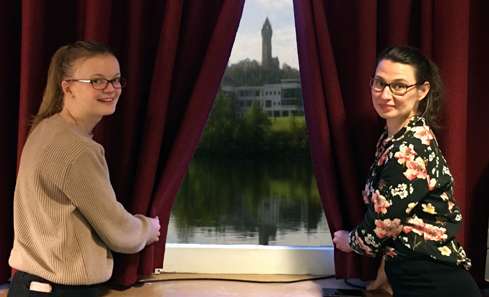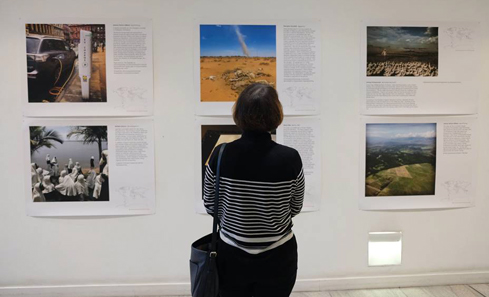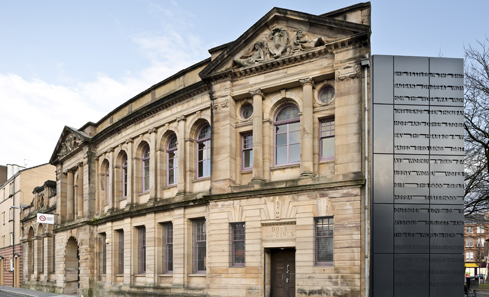 Thermal curtains at Macrobert Arts Centre
Thermal curtains at Macrobert Arts Centre
From double glazing and thermal curtains to smarter travel and forming Green Teams, this guest post by Creative Carbon Scotland explores some of the ways in which the 121 organisations in our Regular Funding Network 2018-21 are working to reduce their carbon footprints.
The need for urgent and unprecedented action and change across all of society was underlined last year by the publication of the landmark report by the UN Intergovernmental Panel on Climate Change (IPCC). Released in October 2018, it warned that the next 12 years are a crucial time for climate action to avoid significantly worsening the risks of drought, floods, extreme heat and poverty for hundreds of millions of people.
When Regular Funded Organisations were asked in April 2018 to start planning to reduce their carbon emissions during their 3-year funding period, it was bound to be both interesting and challenging for everyone involved but the need for this world leading programme for the Cultural sector couldn’t be more clear.
The response from the RFOs was overwhelmingly positive, staff at Creative Scotland provided valuable support in coordinating the process and by the end of the first year of planning there were 111 plans completed, full of brilliant emissions reduction projects to take forward.
Creative Carbon Scotland were asked to provide support to organisations while they defined and submitted information on their carbon reduction plans to Creative Scotland for the first time in early October 2018. Creative Carbon Scotland recruited Caro Overy to offer dedicated support by phone and email and this offer was taken up enthusiastically by over 70 out of the 121 funded organisations. Many needed reassurance and advice on how to get started with simple measures while others had been working on imaginative and inspiring schemes for several years already.
The submission process, using a short online survey, was judged to be simple and by the end of 2018, 111 organisations had completed the Carbon Management Planning survey, supplying information on what emissions source they planned to reduce, the scale of the reductions and the costs or savings involved in their actions.

Based on the largest sources of emissions, the strongest reduction projects were mainly around travel, and saw:
Some of the most imaginative projects aimed to exert a strong influence on audiences, such as Street Level Photoworks’ planned exhibition on climate change with a comprehensive social media campaign to encourage audiences to use public transport and active travel, while Starcatchers is providing free bus tickets both to switch audiences out of cars and to allow new parents without access to cars to attend performances.
 "Everyday Climate Change" exhibition at Street Level Photoworks
"Everyday Climate Change" exhibition at Street Level Photoworks
Electricity use was also a focus and several organisations which owned buildings - including Stills Gallery, Shetland Arts, Macrobert Arts Centre and many more - undertook to bring forward installation of more efficient lighting which was expected to provide significant emissions and cost reductions.
Macrobert Arts Centre are installing thermal curtains to create a warmer venue, more efficiently whilst Glasgow Women's Library are double-glazing windows in their building over the Regular Funding period.
 Glasgow Women's Library
Glasgow Women's Library
Almost all organisations recognised opportunities for waste reduction particularly for publicity and marketing material and audience use of cups, straws etc.
Waste reduction measures are generally not associated with large emissions reductions but can be worthwhile as they have significant influence on audiences and this has been recognised by Panel with their planned exhibition on Design and Build, Reuse and Recycle.
Encompassing all these ideas, many smaller organisations in artist’s studios such as the CCA in Glasgow, plan to come together to form Green Teams to influence the way tenants and landlords use their studios.
For some, reducing emissions may not be possible immediately, as the first years will involve carrying out research to understand their major sources of emissions, or they are embarking on long term plans like Travelling Gallery who plan to find a more efficient replacement diesel generator and ultimately redesign the gallery bus which will bring about emissions reductions well into the future.
This recognises that different organisations have different opportunities to reduce emissions both within and without their own organisations and Creative Carbon Scotland encouraged each one to be creative, working within their own context and where possible to use their projects to develop their knowledge and share it with others.
Some of the more complex questions which came up quite frequently were around the use of Carbon Offsetting and Green Energy Tariffs and several organisations were aiming to become ‘Carbon Neutral’. Although these are probably worthwhile actions, the concept of ‘Carbon Neutrality’ is problematic and we were clear that plans should show real actions and a direct reduction in the emissions produced by the organisation.
In response to the many enquiries we did some more detailed investigations on Carbon Neutrality and other concepts and published the results of our investigations in the Carbon Management Plus page of our website.
Creative Carbon Scotland supplied guidance and feedback on each plan submitted and invited several organisations to present information on their plans to the Carbon Management Planning sessions at the Green Arts Conference.
Peer to peer support was judged to be of primary importance by the RFOs so information on plans submitted was shared on the Creative Carbon Scotland website in Carbon Management 2018-21: Who’s Doing What?. This Resource shows what others have included in their Carbon Management Plans and can be used as a basis to connect RFOs with each other.
In response to feedback and questions during the plan submission process Several other dedicated resources were developed and are available on the Creative Carbon Scotland website.
After this first year of intensive learning for everyone involved in the whole Carbon Management Planning process we’ll be encouraging everyone to review their 3 year plans to find out what’s worked and what hasn’t and use what we’ve all learned to change plans if needed or to try out new ideas. Experience has shown that the Cultural sector learns fast!
In response to feedback Creative Carbon Scotland is working with Creative Scotland staff to support networking and sharing among the sector and to develop the support programme and submission process further. Watch this space for more news!
We’ll be hosting #GreenArts Day 2019, an opportunity to showcase the sector’s work on environmental sustainability to the world. Get planning for Thursday 14 March 2019 for a huge online celebration to show off how you do #GreenArts – Get some inspiration on our website!